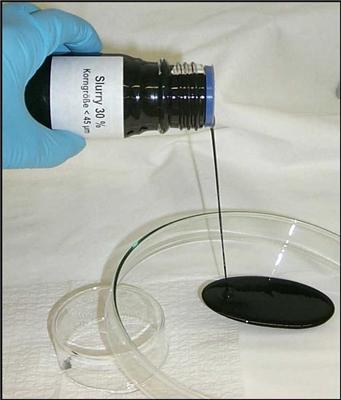“BioBoost” targets the conversion of residual biomass into energy carriers in order to obtain superior-quality and engine-compatible fuels and chemicals as well as generate heat and electricity. Karlsruhe Institute of Technology (KIT) will co-ordinate for the project that is set to commence in the early part of 2012.
 BioSynCrude®: Energy density of this intermediate product is up to ten times higher than that of the feedstocks. (Photo: IKFT, KIT)
BioSynCrude®: Energy density of this intermediate product is up to ten times higher than that of the feedstocks. (Photo: IKFT, KIT)
Seven industrial partners and six research institutions from the whole of Europe will take part. Research conducted under the BioBoost program will be based on KIT’s bioliq concept, which is intended for the generation of designer fuels for Otto and diesel engines from biogenous wastes such as straw.
Out of the two projects selected for funding as per the 7th EU Research Framework Programme from a large number of proposals, BioBoost is one of the two projects aimed at developing new energy carriers. The time period of the project will be three and a half years and will be financed by the EU with an amount of almost EUR 5.1 million. The grant awarded to KIT will be almost €1 million.
BioBoost will aim at the production of a number of energy-efficient transitional products from biogenous wastes and will assess and test them based on their utility like in the bioliq approach. Along with the BioSynCrude obtained by flash pyrolysis using the bioliq technique, BioBoost will manufacture, optimize, and test other intermediate products also. Additionally, the project will analyze the fiscal efficiency of the total process, optimize logistics chains and investigate ecological compatibility. The goal is to considerably enhance the efficiency of the utilization of residues and biomass in the coming years.
The technique includes concentrating the energy as the residual biomass, such as straw, which rises in a spatially distributed fashion and comprises a minimal amount of energy. At decentralized plants, biogenous wastes are modified into oil and coke by carbonization or pyrolysis. These products are blended to result in energy-efficient intermediate products that have around 90% energy in the biomass. They can be moved cost-effectively to a central area for additional processing. The energy carriers are then used in large-scale applications. Further to the production of custom-made fuels, for instance, kerosene, gasoline or diesel scientists will also study the production of chemicals such as ethylene, methanol and propylene and plastics.